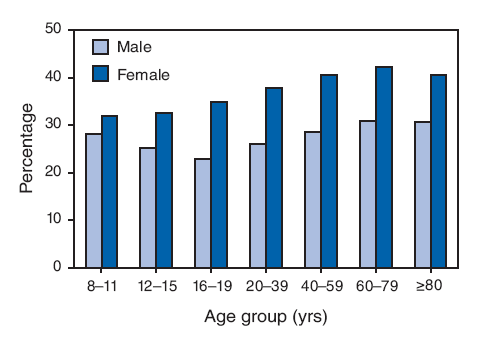Fat-Free Mass Index:
Table of Contents
Fat-Free Mass Index Chart
Calculate your fat free mass index using the FFMI calculator above and compare your results against the FFMI chart below. The values in this chart apply to both genders.
| FFMI Range | Description |
|---|---|
| Underweight | < 18 |
| Average | 18 - 20 |
| Above Average | 20 - 22 |
| Excellent | 22 - 23 |
| Peak Fitness | 23 - 26 |
| Extreme Levels | 26 - 28 |
| Steroid Use Likely | > 28 |
What is Fat-Free Mass Index?
The Fat-Free Mass Index (FFMI) is a measurement of body fat percentage in comparison to your entire body weight. Calculating your FFMI is important because it provides early indications of health risks.
An individual with a higher percentage of body fat has a greater risk of developing heart disease, stroke and other serious illnesses than someone with a higher fat-free mass index score.
How to Measure Fat-Free Mass Index
To measure your fat-free mass index, follow these 3 simple steps:
- Measure your height in centimeters.
- Measure your weight in kilograms.
- Measure your body fat percentage.
- Enter details in the FFMI Calculator.
You will instantly get your FFMI score as the result of this calculation.
Why Measure FFMI?
Determining whether you are at a healthy weight is important for many reasons. The most common method for doing this is to step on a scale, but if you are looking for something a little more accurate, then Fat-Free Mass Index (FFMI) might be a better alternative for you.
This measurement essentially calculates your body fat as a percentage of your overall weight. It's not perfect, but it's gaining in popularity as people realize that it's a more accurate reflection of body composition than BMI.
Is FFMI Better than BMI?
The accuracy of BMI has been called into question on several occasions in recent years, with some experts claiming that it is no longer a reliable measure of health. For this reason, researchers have been trying to find better ways to measure health.
There are a few reasons why alternative health tests like the FFMI Calculator and the RFM Calculator are seen as a more accurate measure than BMI:
- BMI doesn't account for different body types
- BMI does not take into account how much of a person's weight is muscle
- BMI does not always give an accurate picture of someone's health
Because of these limitations, it is possible for BMI to give an inaccurate picture of your health.
For example: a person who is very muscular may still have a high BMI but a low FFMI. This is because BMI does not take into account visceral fat, which is the type of fat that is most harmful to health.
What is the Fat-Free Mass Index?
The Fat-Free Mass Index (FFMI) is a measure of body composition that takes into account both muscle mass and body fat. It is calculated by dividing one's fat-free mass (FFM) by their height squared. FFMI was created to compare people of different body compositions.
The average FFMI for male athletes is 25, while the average for female athletes is 21.5. Some people, including bodybuilders, have been known to reach an FFMI of 30.5, which is considered the upper bound for natural athletes. It takes extreme work and dedication to reach this level.
The FFMI calculator is a useful tool for athletes and bodybuilders to track their progress and ensure that they are staying within a healthy range.
What is the Fat-Free Mass Index Formula?
The fat-free mass index formula (or FFMI formula) varies based on gender. You can calculate relative fat mass percentage using the following formula:
Fat-Free Mass Formula:
Fat Free Mass = weight [kg] * (1 - (body fat [%]/ 100))
FFMI Formula for Men/Women:
FFMI = fat free mass [kg]/ (height [m])²
What is the Average Body Fat Percentage?
The percentage of body fat we have varies depending on our age and gender. Women, on average, have more body fat than men.
The CDC's study from 1999-2004 shows that, on average, men have a higher body fat percentage than women (see chart below).
- Men have an average body fat percentage of 24% to 30%
- Women have an average body fat percentage of 32% to 42%

FAQS
Fat-Free Mass Index (FFMI) is a measurement used to assess the amount of lean or fat-free mass in relation to height. It is calculated by dividing the fat-free mass (muscle, bone, and other non-fat tissues) by the square of the height in meters.
FFMI is calculated using the following formula: FFMI = (Fat-Free Mass in kg) / (Height in m)^2. The fat-free mass includes muscles, bones, and other non-fat tissues.
The normal range for FFMI can vary based on factors like age, gender, and fitness level. Generally, a healthy FFMI range for men is around 18-25, and for women, it's around 15-20. However, it's important to consult with a healthcare professional for personalized assessments.
While BMI considers total body weight in relation to height, FFMI specifically focuses on the amount of lean or fat-free mass. FFMI provides a more nuanced assessment of body composition, especially for individuals with higher muscle mass.
FFMI can provide valuable information about an individual's body composition, especially for athletes or individuals with high muscle mass. However, it's just one of many metrics and should be considered alongside other health indicators. Consulting with a healthcare professional for a comprehensive assessment is recommended.
FFMI is particularly useful for individuals with higher levels of muscle mass, such as athletes and bodybuilders. It may not be as informative for those with lower levels of muscle mass. It's important to consider individual factors and consult with a healthcare professional for personalized assessments.